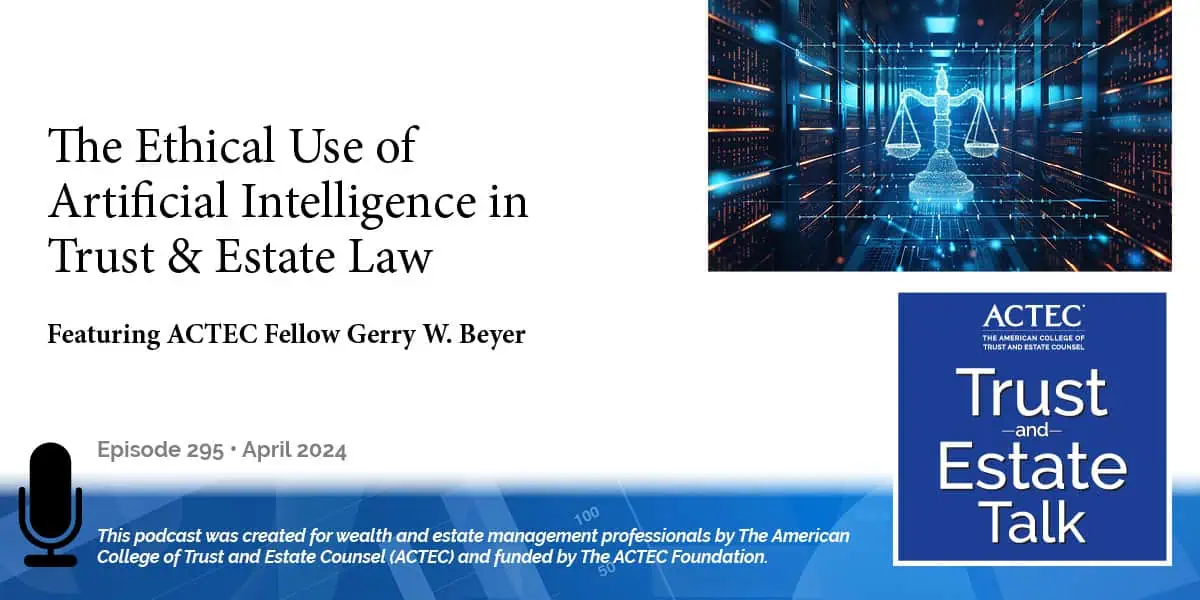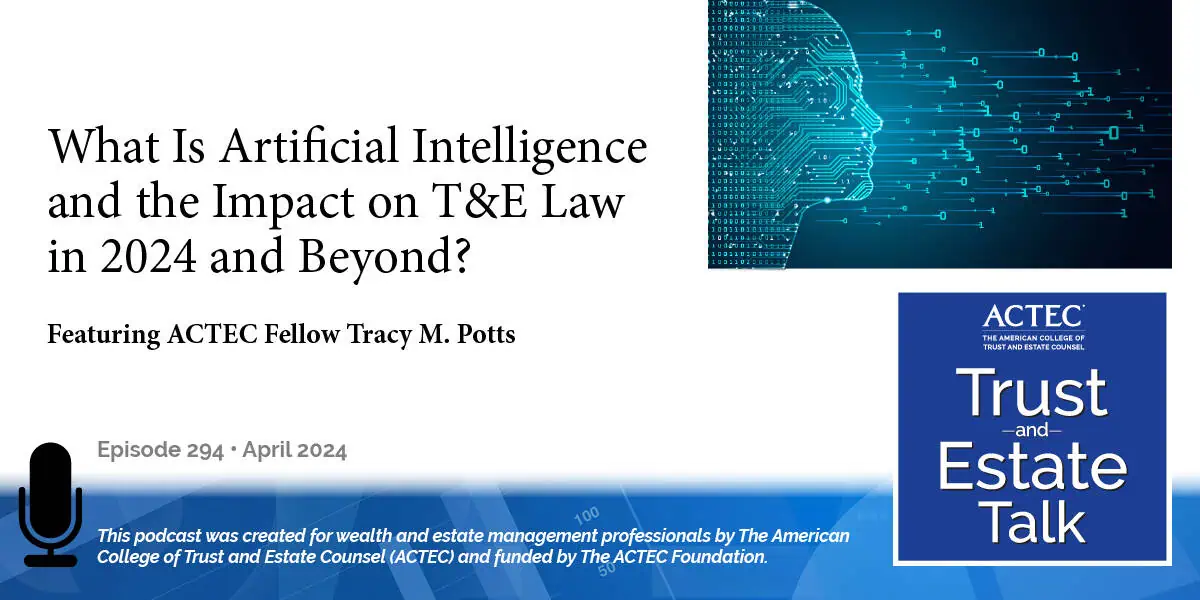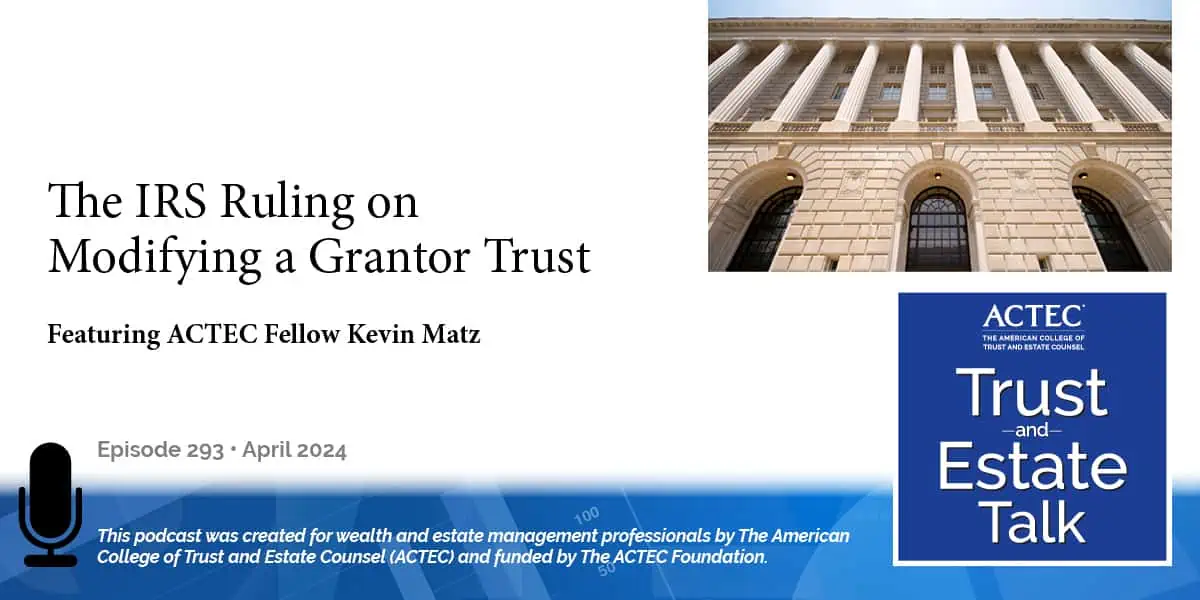Relief for S Corporation Mishaps

“Relief for S Corporation Mishaps,” that’s the subject of today’s ACTEC Trust and Estate Talk.
Transcript/Show Notes
This is Doug Stanley, ACTEC Fellow from St. Louis, Missouri. S Corporations require various elections, and restrictions are imposed on ownership of S Corporations. Revenue Procedure 2022-19 sometimes provides relief when taxpayers mess up elections or violate ownership restrictions. ACTEC Fellow Steve Gorin, also from St. Louis, offers suggestions and advice to address mistakes. Welcome, Steve.
Thank you very much, Doug, pleasure to be here. So, S Corporations are a real funny animal in our tax law. So, an S Corporation is a corporation that doesn’t pay its own federal tax. Instead, the shareholders elect to pay the tax on the S Corporations’ earnings. So, the S Corporation files an annual income tax return, Form 1120-S, and reports on all its items of income, deductions, credits, et cetera. And then, the S Corporation gives a schedule K-1 to its owners and then they need to report that income on their tax returns. Now, a lot of times, taxpayers will mess up on some of the requirements of an S Corporation.
S Corporations: Qualified Subchapter S Subsidiary (Q-SUB)
You need to file the correct form to make the S election and then there’s another animal under the S Corporation rules called the Qualified Subchapter S Subsidiary or QSub. And a Qsub is another corporation that the S Corporation owns. And the parent S Corporation will elect to be taxed on all of its subsidiary’s income so that the subsidiary becomes a disregarded entity. So, just like a single-member LLC is disregarded from its owner, a Qsub is disregarded from its parent S Corporation. Also, an S Corporation is limited in the number of owners it can have and they can only be certain types of persons. And the S Corporation stock needs to provide identical rights to distributions and liquidation proceeds.
So, this requires that you have identical, per share, distributions of – annual distributions from the corporation and liquidation proceeds, is referred to as the “single class of stock rule.” Now, an LLC or partnership or other unincorporated entity can elect to be taxed as an S Corporation, but there’s a lot of times that’s subject to error because a lot of times, that’s subject to error because a lot of times, people will take their LLC operator agreements or partnership agreements and leave in the partnership income tax rules and then they make the S election and oops, the partnership income tax rules have a lot of complicated things in there that do not conform to the single class of stock rule. So, it’s easy for a partnership or an LLC that elects S Corporation status to mess that up.
You can have other mess-ups as well with the S Corp election if it’s not filled out properly with all the proper signatures. Then the S Corporation election is not valid. And similarly, the Qsub election can have mistakes on it too. So, Congress has instructed the IRS to be really generous with taxpayers; if they mess up Congress wants the IRS to provide relief. Congress, in fact, has mandated the IRS provide relief. But Congress also has said that the IRS needs to protect itself and not get whipsawed. So, just imagine if you had an S Corporation that had some kind of flaw here, and then the IRS let it correct that flaw.
And so, you have a corporation that, because it had a flaw, it would have to pay taxes itself as a C Corporation, and it wouldn’t be issuing a K-1 to the shareholders. So, if it did have that flaw, the shareholders would not have to be paying taxes on the corporation’s income because it gets reinvested inside the corporation because the S election is not valid. On the other hand, let’s suppose the taxpayers want to get this relief because an S Corporation lets you have only one layer of tax on your earnings, whereas in a C Corporation, the corporation has to pay taxes on earnings. And, when those come out as dividends, the shareholders have to pay taxes on that again.
So, the S Corporation status is really helpful. So, you want to cure any defects and have the S Corporation status maintained. But at the same time, the IRS is going to be kind of like, well, what if we grant the S election treatment and then a shareholder later objects and says, hey, it was a C Corporation. I shouldn’t have gotten that K-1. I shouldn’t have been taxed on it. So, then the IRS can get whipsawed by the taxpayer and the S Corporation taking inconsistent positions. So, the normal way to get relief is to have a private letter ruling issued and all of the shareholders have to consent to the S Corporation treatment, and then the IRS issues a private letter ruling and all is well.
Now, the IRS feels burdened by issuing lots of private letter rulings, and there are some private letter rulings where there are some mergers and acquisitions going on, and the buyer’s tax advisors tell the buyer, “Hey, there’s this, that, and the other little flaw.” Basically, those of you have heard stories of people abducted by UFOs and then the aliens do invasive body probes. That invasive body probe is kind of what buyer’s tax counsel will often do. And so, the buyer’s tax counsel will say, well, go get a private letter ruling, and the IRS is just tired of issuing these private letter rulings for all these little nips.
Internal Revenue Procedure: 2022-19
So, let’s go through some of these things that the IRS is providing relief for. This Revenue Procedure 2022-19 said you can get automatic relief without getting a private letter ruling, and it can be if you had some kind of a fault in your documents that it might look like it might violate the single class of stock rules. And so, the revenue procedure gave a way to correct those, and there may be some disproportionate distributions that were made. The IRS’s position is that these disproportionate distributions that are not authorized by the governing documents do not constitute a second class of stock. And the IRS set forth that in this private letter ruling.
Also, what do you do if you have some mistakes on your S election or your QSub election? So, the revenue procedure gives you automatic relief for those as well. When you submit those forms to the IRS, the S election, or the QSub election, the IRS is supposed to acknowledge it. Sometimes taxpayers don’t get that, and they don’t know where to turn, and the revenue procedure also tells you what to do to get that information. Also, sometimes people might have filed their income tax filing inconsistent with the S election or the QSub election, and the IRS tells you what to do with that as well. So, this revenue procedure provides a lot of help for people.
Internal Revenue Procedure: 2013-30
There’s another revenue procedure dealing with more estate planning things. Revenue Procedure 2013-30. So, 2013-30, that a lot of estate planners have relied on before – that revenue procedure has not changed in any matter whatsoever. So, this new Revenue Procedure 2022-19 just adds on to the relief that’s available. I hope you found this helpful and look forward to future contact with you. Thank you.
Thank you, Steve, for providing your expertise on S Corporations.
You may also be interested in ACTEC Trust and Estate Talk Business Planning Podcasts.
This podcast was produced by The American College of Trust and Estate Counsel, ACTEC. Listeners, including professionals, should under no circumstances rely upon this information as a substitute for their own research or for obtaining specific legal or tax advice from their own counsel. The material in this podcast is for information purposes only and is not intended to and should not be treated as legal advice or tax advice. The views expressed are those of speakers as of the date noted and not necessarily those of ACTEC or any speaker’s employer or firm. The information, opinions, and recommendations presented in this Podcast are for general information only and any reliance on the information provided in this Podcast is done at your own risk. The entire contents and design of this Podcast, are the property of ACTEC, or used by ACTEC with permission, and are protected under U.S. and international copyright and trademark laws. Except as otherwise provided herein, users of this Podcast may save and use information contained in the Podcast only for personal or other non-commercial, educational purposes. No other use, including, without limitation, reproduction, retransmission or editing, of this Podcast may be made without the prior written permission of The American College of Trust and Estate Counsel.
If you have ideas for a future ACTEC Trust & Estate Talk topic, please contact us at ACTECpodcast@ACTEC.org.
© 2018 – 2024 The American College of Trust and Estate Counsel. All rights reserved.
Latest ACTEC Trust and Estate Talk Podcasts

The Ethical Use of Artificial Intelligence in Trust & Estate Law
A law professor offers insights into the risks, rewards, duties and ethical considerations of lawyers using AI in their T&E practices.

What Is Artificial Intelligence and the Impact on T&E Law in 2024 and Beyond?
A primer on the types and uses of AI, then a deeper dive into the impact on trust and estate law from types to applications to ethical considerations.

The IRS Ruling on Modifying a Grantor Trust
Explore the gift tax implications for trust beneficiaries modifying grantor trusts in IRS CCA 202352018, with nuanced analysis and estate planning insights.

